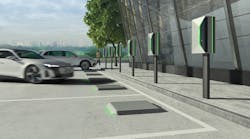Siemens and MAHLE signed a letter of intent to collaborate on the study of inductive, or wireless, charging of electric vehicles. MAHLE is a Stuttgart, Germany-based maker of automotive parts and supplies.
“Wireless charging of electric vehicles is emerging as a major market for the future. In addition to making life considerably easier for drivers, who no longer have to fiddle with cables and connectors, it is a crucial requirement for the autonomous mobility of tomorrow. The transfer efficiency of wireless, inductive charging is comparable to plug-in systems,” said Stefan Perras, Head of Pre-development and Innovation for Charging Infrastructure at Siemens AG.
One aspect of the planned cooperation includes coordinated standardization efforts in the relevant pre-standardization and standardization bodies. The goal is to close gaps to ensure full interoperability between vehicles and the charging infrastructure.
In addition, there are plans for a close exchange of ideas to develop a complete inductive charging system for electric vehicles. MAHLE aims to contribute its many years of experience as an automotive supplier and Siemens its expertise in the field of charging infrastructure.
Both parties are also planning extensive interoperability and cross-testing between the charging equipment on the vehicle (secondary coil) and the charging infrastructure (primary coil). This will allow for technical improvements and validation of inductive charging systems for electric vehicles and ensure interoperability. Some of the testing will be performed as part of publicly funded projects.
As a full-service provider for eMobility charging infrastructure, Siemens eMobility offers a complete range of AC and DC charging hardware, software and services – from residential to commercial to depot applications.
“Siemens’ core expertise in smart buildings and smart grids makes us uniquely positioned to meet our customers’ needs with comprehensive solutions and to help them design, install and manage sustainable charging solutions for a better future,” Perras added.


